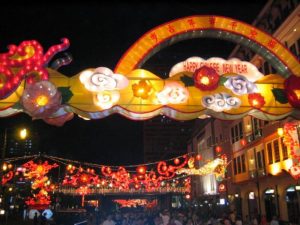Calling all Swifties and pop culture enthusiasts! Prepare to delve into the fascinating world of “Swiftenomics” – the economic phenomenon surrounding Taylor Swift’s record-breaking Eras Tour. Read on to find out more about how her Singapore stop infused the Lion City with a staggering economic boost.

Image via Wikimedia Commons – Paolo V, Taylor Swift The Eras Tour 1989 Era Set (53109969425), CC BY 2.0
Swift’s Midas Touch: A Tour for the Ages
Taylor Swift’s Eras Tour is a global phenomenon, spanning five continents and over 150 shows. Launched in March 2023, it’s set to continue its reign well into winter 2024. At the heart of this success lie her devoted fans, the “Swifties.” They’re not just spectators – they’re active participants, contributing to the tour’s meteoric rise with over $1 billion in ticket sales. With this kind of power, it’s no surprise the Eras Tour is already the most profitable concert event ever! Unsurprisingly, Taylor Swift, with an estimated fortune of $1.1 billion, is a recent addition to Forbes’ prestigious list.
The Singapore Stopover: A Sold-Out Sensation
Singapore emerged as the sole Southeast Asian stop on the Eras Tour, as Swifties from around the world turned out in force. Six sold-out shows on 2nd, 3rd, 4th, 7th, 8th, and 9th, March 2024 saw over 300,000 tickets vanish faster than you can say “Shake it Off!” The venue for these phenomenal performances was the National Stadium located within easy reach of hotels near Singapore city centre. These include properties in the Civic District such as Grand Park City Hall which make an ideal base for those planning on attending such concerts.
The Staggering Numbers: A Tourism Triumph
Thanks to Taylor’s magic touch, Singapore’s projected economic growth for 2024 received a significant boost. According to Forbes, economists estimate the influx of foreign Swifties attending the concerts injected a cool $225 to $300 million into the city-state’s economy in the first quarter! This translated to a surge in flights, hotel bookings, and occupancy rates, making it a win-win for both fans and Singapore’s tourism industry.
More Concerts to Rock the Lion City
While Taylor Swift may have stolen the show for now, Singapore’s concert scene is sizzling! 2024 has also seen performances by other global music sensations the likes of Coldplay and Bruno Mars, and the party’s far from over. K-pop queen, IU graces the stage in April (20th and 21st), followed by rock bands Boys Like Girls (25th) and INCUBUS (29th). Pop favourites Lauv (4th May) and Niall Horan (9th May), as well as Japanese rock band, RADWIMPS (11th May), are lined up as well, with NCT Dream bringing the heat in June (29th and 30th). Keep your eyes peeled and ear to the ground because there are more big names heading to the Lion City!












